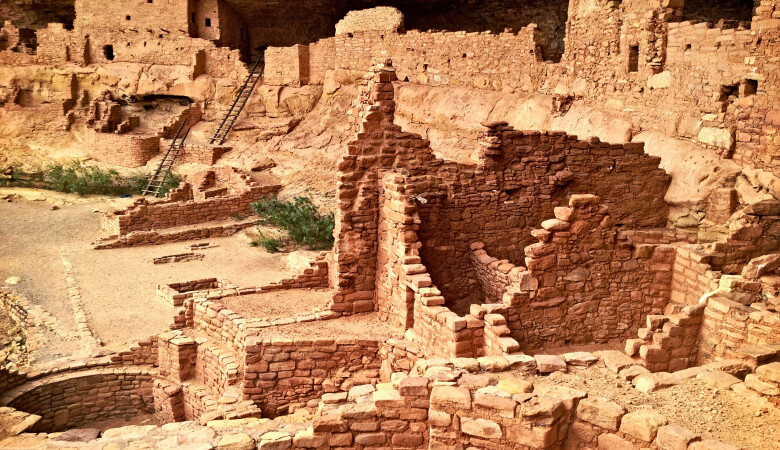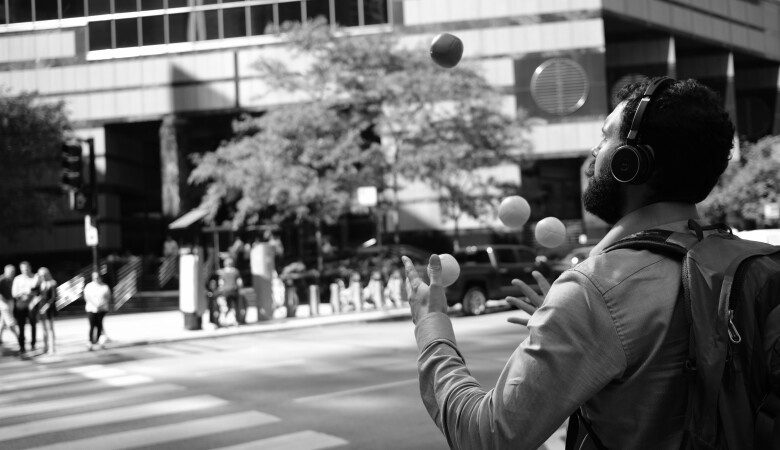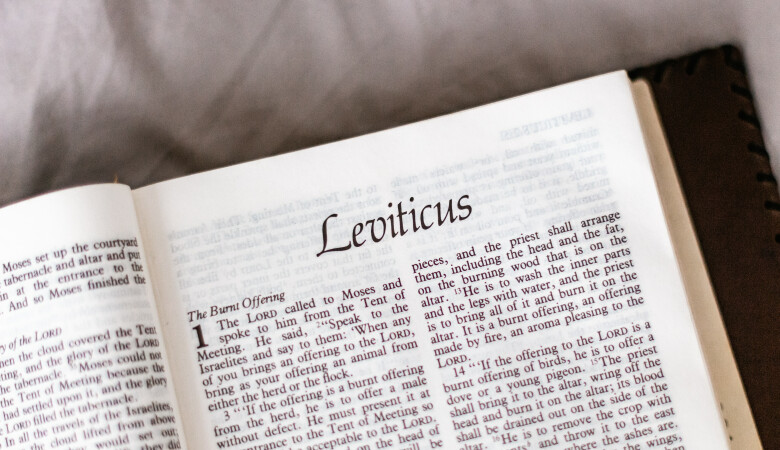Melchizedek, the Priest-King, a Pattern of Christ (Hebrews Sermon 25 of 74)
April 10, 2011 | Andy Davis
Hebrews 7:1-3
The Offices of Christ, Prophecy
I. The Difficulty of Accepting Change
In one of the most beautiful Psalms in the Old Testament (Psalm 103) it is written, "As for man, his days are like grass, he flourishes like a flower of the field. The wind blows over it and it is gone and its place remembers it no more." That is the changeable-ness of human experience, isn't it? Have you ever gone back to some place that you are familiar with in your childhood or in your teen years and you realize that the physical things, many of them are still there, but it's just not your time for that place anymore. Time has moved on and you don't belong there, anymore. I remember returning to my high school, I only did it once to visit all my teachers and talk to them, and I never went back. It wasn't that they were unfriendly. It was more... I just sensed that the time had moved on and it was actually odd for me to be there. And the hymn "Be still my soul", It speaks about how, when change and tears are past we are welcomed into eternity with great joy.
Change. Change itself can be very depressing, very discouraging, and yet, this is the very thing we are yearning for... We want to be transformed, and want to be liberated from these bodies of death, don't we? We want to be transformed and be made like Christ. But the process itself can be very painful. I would say there's been no era in history that has seemed more radical changes to everyday life than those that have lived through the 20th century on into the 21st century, spent a time of extraordinary change. Just think about the years that have passed, since the end of World War II, the incredible changes, political changes the rise and fall of communism in that period of time. How for the longest time, it was a beast that seemed unbeatable and now seems to be completely discredited, not entirely gone but on the down spiral of its existence. We've seen technological changes it's even somewhat humorous now, Best Buy where you can buy some of the hottest newest electronic equipment is kind of spoofing their own and actually coming up with a program that if you buy something and it then becomes obsolete in the next six months, you can buy the new improved version. So there's an ad, a guy standing at the front step as they're delivering his 3D TV and there's an ad for 4D TV going by. And he is distressed, and his daughter running around saying you bought the wrong TV, you silly head. And things just transforming right in front of us at every moment. Technology, Twitter, and YouTube, and all of these things. We're just used to change, but it's very destabilizing. It can make us feel insecure. We forget that underneath are the everlasting arms, that we are resting on the eternal covenant of all mighty God and God's intention showed us have never changed.
Difficult Changes for First Generation Jewish Christians
But for all of the great changes that we have personally experienced that we continue to experience were almost used to it by now, I think there have been no greater spiritual change is no generation ever had to endure greater spiritual changes than the generation that lived around the time of Christ and beyond. The Jews who lived in Palestine and who were completely accustomed to the sacrificial system around the temple to the thrice annual pilgrimages that they were required under the law of Moses to make to go up and render to God animal sacrifices, blood sacrifices. To be told that the temple sacrifices and the Levitical priesthood was now obsolete. And that we have an entirely new way of approaching God is staggering and bewildering. And some Jews even Jewish Christians that had come to faith in Christ, I'm certain reeled at the implications of Jesus's death on the cross.
The Point of Hebrews 7: There is a Change of the Priesthood
And I believe that that's the whole point of Hebrews 7, is to announce very clearly that there is a change of the priesthood, and if there is a change of the priesthood there must of necessity, be a change of the law, the time has come for change. So if you were to look at Hebrews 7:12, it says, "For when there is a change of the priesthood there must also be a change of the law." So the Aaronic priesthood, the Levitical priesthood had now become obsolete, so also the Mosaic Covenant that had established it, that is the staggering implication of the life, the death, the resurrection, the ascension, of Jesus Christ for centuries, the Levitical sacrificial system with the sons of Aaron as high priest administered by the command of God. Generations of Jews had then born had grown up had lived their lives and had died under the ministrations of the Levitical priesthood. The priest who were the sons of Aaron. Millions and millions of lambs and sheep and goats and bulls had been sacrificed. A river of blood had flowed.
In redemptive history, the tabernacle, that movable tent of Moses, of the days of Moses, and of the exodus a given way eventually, to a stable building the temple of Solomon. Because of the sins of the people God had allowed the Babylonians to destroy the temple, flatten it, raise it to the ground. But then in the providence of God under Cyrus the Great of Persia some small number of Jews, 42,000 have been allowed to return to Jerusalem and begin to rebuild their lives and under the leadership there, under Ezra the priest and Haggai the prophet. The temple had been rebuilt smaller, not so glorious, but the animal sacrificial system had been re-established and had resumed. And so they continue to minister from that time until the time of the Book of Hebrews, 1st century AD, the temple had been the focal point of the entire nation spiritual focal point of the nation of Israel. Three times a year, all Jewish men were commanded to go up and to offer sacrifices that that one place that God had chosen out of all the tribes, and they had offered their sacrifices, there but now all of it was obsolete. Book of Hebrew said what is obsolete and aging would soon disappear.
From the moment that Jesus Christ stated of those marvelous words, "It is finished", curtain of the temple was torn in two from top to bottom, the doors of Heaven had been thrown open wide to any who believe in Jesus, the time for animal sacrifice was over, there was a new high priest and his name was Jesus.
The Remedy: To Prove from Scripture that God Had Planned to Make this Change
And this would be incredibly difficult for the Jews to accept more than we can possibly imagine. And so the remedy that the Lord has given us here in Scripture, through the author to the Book of Hebrews was to prove from Scripture that God had planned this all along, that this had been the plan of God all along. That the Levitical priesthood was just temporary. So the argument of Hebrews 7 is that God had established the priesthood of Jesus in the order of Melchizedek before he established the priesthood Aaron; and that this priesthood in the order of Melchizedek, had always been infinitely superior to the priesthood of the house of Aaron.
Jesus was the fulfillment of all priesthood, but specifically of this new order, established by his death and his resurrection, his ascension a priest in the order of Melchizedek, and that this had been foreshadowed in the days of Abraham, their father. Way back in Genesis 14, had been recorded, mysteriously had been picked up on by a single verse in Psalm 110. Psalm 110:4, King David had written, "The Lord has sworn and will not change his mind who are a priest forever in the order of Melchizedek." Psalm 110:4. Hebrews 5 has already introduced this theme. Hebrews 5:6 says, "So Christ also did not take upon himself the glory of becoming a high priest. But God said to him, 'You are my son today, I have begotten you.' And he said in another place, 'You are a priest forever in the order of Melchizedek.'" So that's in chapter five we've already brushed against this idea. And then in 5:10, Jesus was designated by God to be high priest in the order of Melchizedek.
Suddenly in mid-stride, the author of the Hebrews stops himself says we have much to say about this. This theme of Melchizedek, we have a lot to tell you about Melchizedek we want you to understand about Melchizedek. But it's hard to explain because you become literally lazy listeners to the Word of God. By this time, you should have made further or greater progress, than you have. And so, he stops and he addresses them with great concern with great intensity, with passion and He warns, them of the danger of apostasy in chapter 6, of not continuing to make progress, of keeping step with the Spirit, as God is unfolding redemptive history before their very eyes. And as things are changing, and as things are developing, that they need to keep up with what God is doing is revealed in the written word. So throughout Hebrews 6, he warns them, he encourages, he exhorts them and at the end of the chapter, he returns to Melchizedek, he says that we have through the ministrations of Jesus, the high priest, we have this hope in Jesus hope and the promises of God as an anchor for the soul that enters this hope, this chain that holds us to the promises of God and to hope it enters the inner sanctuary behind the curtain, where Jesus has entered on our behalf. He has become a high priest in the order of Melchizedek.
So at the end of chapter six, He returns to this theme that he'd been wanting to develop but he needed to stop and deal with them personally. And so, we have returned now to Melchizedek. Melchizedek was a type of Christ, who will give them a deeper and richer understanding of Jesus Christ as our great high priest.
The Types of the Old Testament
Now, what do we mean by the word type? What is a type? Well, a type is in biblical study we use the word type to refer to an Old Testament person or practice or ceremony that has a counterpart technically called an anti-type, I think more simply just a fulfillment because types are prophecies a fulfillment in the New Testament. So in that sense, types are predictive. They are predictive prophecies, but they're acted out in history, they're different from verbally predictive properties in which something's just laid out verbally, and we're told what's going to happen. These things are acted out in history, things are acted out, and then they're fulfilled. And there are many, many examples of types, I think Noah's ark in the midst of that flood was a type, a picture of the salvation that Jesus gives, us rescue from the wrath of God, one place only must be on that arc.
And so there is no other name under heaven given to men, by which we must be saved, than Jesus Christ. Jesus is the ark of our salvation. It's a picture acted out or Abraham's offering of his son Isaac, on Mount Moriah, which God said, "Take your son, your only son, Isaac, whom you love, and go to the region of Moriah. Sacrifice him there…" It's a picture of what God would do with Jesus, a picture of Christ. Certainly, the Passover lamb in Exodus Chapter 12, that would be slaughtered and its blood painted over the door posts, etcetera, which delivered them from the angel of death before the right before the exodus a clear picture of the death of Jesus, the blood of Jesus rescuing us from our sins. The Exodus as a whole, the whole movement of the people of God out of bondage out of slavery in Egypt, and through great trials and on into the promised land, a type of the whole salvation of sinners. We are edeemed from slavery to sin, and brought into the promised land of heaven of our Sabbath rest. The bronze serpent is a type how the Jews and their sinfulness were being judged by God with poison of snakes and God commanded them to make a bronze serpent. All you had to do is look at the serpent if you looked you would be saved from death. And so in the same way, God sent his only begotten son that whoever believes in him should not perish but have eternal life, the bronze serpent, a picture of saving faith.
So many types and pictures, and this Melchizedek, is a type of Christ. He's a picture of Christ ahead of time. Now, I just think this is marvelous. Isn't it? Isn't this awesome that God plays history, like a virtuoso violin plays a magnificent piece and it's even better than that, because God wrote the piece that's being played, he writes the music and then he acts it out, sovereignly and just put in scatters like diamonds. These types throughout history to show God's in charge of history and history has meaning. It's just a beautiful thing in Melchizedek is a type of Christ.
The Goal: to Establish the Infinite Superiority of Christ as our High Priest
And God's purpose here in Hebrews, is to establish the infinite superiority of Christ to any other priest you could possibly imagine, certainly superior to the ironic the Levitical priest. And so the author desires to remove uncertainty, and doubt from the minds of these first century Jews who are so tempted and so, afflicted and such a strong pull on them to forsake Christ because they're being persecuted and they're being pressured, by their Jewish neighbors and relatives and authority figures, to give up on Jesus as though he's a cult leader, a deceiver of the people, and turn away from Jesus and go back to Old Covenant Judaism. And what the author's saying is, you can't do that, you can't go back.
Because Jesus is the fulfillment of all of that and the priesthood of Jesus is infinitely superior to the priesthood of Aaron and his descendants. His goal then is to free these Jewish Christians from any temptation to go backward, to forsake Christ and to go backward. And it's a message, a timeless message to us who are not Jews, living in the first century were under no pressure to go back to something we never knew. We're under no pressure we're not being tempted sorely to offer a cat or a dog for our sins, in the backyard or a sheep or a goat. We're not under that kind of pressure, but you under the same pressure to forsake Jesus, that they were. You're under the exact same pressure to turn your back on Jesus and go back to your life of sin. And so these words show us the certainty of our faith, and the greatness of our high priest, at the right hand of Almighty God. He was constantly praying for you. And so this message is for us who are Gentile believers as well.
II. The History of Melchizedek (Genesis 14)
So who is this Melchizedek? When I was growing up in the Catholic church, I was an altar boy and a week after week the priest would say different things in the mass that had been written out, and one of the sections was a prayer centered around the offering. And the priest would say, "look, with favor on these gifts and accept them as you once accepted the gifts of your servant Abel. And the gifts of Abraham our father in faith, and as you accepted once the bread and wine, offered by your servant Melchizedek." I heard about Melchizedek every week of my life. And at least five of you have asked me over the last week and a who is Melchizedek. Today is your day. And mine. Finally get an answer.
Now, I must admit, I didn't ever ask, "Who is Melchizedek?" It just wasn't the question wasn't raised and certainly no priest ever explained it, but today we get a clear explanation of who this individual was. Melchizedek was a man, a figure in history, flesh and blood man, not an apparition, not a ghost. I do not believe he was a pre-incarnate Christ. We talk about all that. He was a man who lived at a certain moment in history. His first mentioned in Genesis 14. So put your finger here on Hebrews 7 and go back to Genesis 14, if you like, or just listen but he's mentioned in Genesis 14, with Abraham's involvement in the defeat of King Chedorlaomer around the year 2000 BC, somewhere around 2000 BC. Talk more on this in a moment but I'm just easing into it now. He is next mentioned in Psalm 110, in verse 4, up out of nowhere in the middle of the salter he pops up again. Melchizedek just kind of does it, he just pops up and then he pops up again in Hebrews five and six and seven and then that's it.
But in Psalm 110 Verse 4, as we already quoted, "The Lord has sworn and will not change his mind. You are a priest forever in the order of Melchizedek." David wrote this approximately 1000 years after Abraham and approximately 450 years or so after Moses wrote the account of Abraham. So David wrote around a thousand or so BC Psalm 110. It's a mysterious statement prophecy of strange meaning almost certainly I have to believe that this was uniformly ignored by the Jews as some arcane mystery. So the author to Hebrews picks up this mysterious theme a thousand years later in the first century AD, I think no ordinary Jew living between the time of Abraham and the time of David would have given much of a thought at all to Melchizedek. Ephesians 3, talks about mysteries hidden for long ages past, but now revealed and made known through Jesus.
And I just don't think he was a major theme, and I think no ordinary Jew living between 1000 BC in the time of Hebrews would have even tried to figure out what Psalm 110 verse 4 was talking about. Jesus surprised them with Psalm 110 when he said, "How is it then that David, speaking by the Spirit, calls him [the messiah] 'Lord'"? because it says there in Psalm 110, "The Lord said to my Lord: 'sit at my right hand till I put all your enemies under your feet." "If David calls him Lord, how can he be his son?" Gee, we never saw that before. Scurrying back to the salter, reading and there it is Psalm 110, had never noticed that before. Do you think they noticed Melchizedek too? I don't think they were ready for Melchizedek at that point they weren't ready for verse 1 of Psalm 110. This is a mystery locked into human history, a spiritual mystery that really happened in space and time, but God had a deeper meaning for that, a deeper significance.
So as you're there in Genesis 14, look at verses 18-20. "Then Melchizedek, King of Salem, brought out bread and wine, he was priest of God Most High, and he blessed Abram saying, "Blessed be Abram by God Most High, creator of heaven and earth, and blessed be God Most High who delivered your enemies into your hand, then Abram gave him a tenth of everything." That's it. That is the entire account, other than Psalm 110:4, in the Old Testament of this mysterious figure Melchizedek. There is not another mention. Next time he's mentioned after Psalm 110 is Hebrews 5.
Context of Genesis 14
So what is the context of Genesis 14? Abram not yet called Abraham had left Ur of the Chaldees by faith, traveled to Palestine to receive the promise from Almighty God, that that land would belong to him, and to his descendants forever. His wife Sarai, not yet called Sarah, and his nephew Lot, traveled with him in the course of time, Lot and Abram could not continue to sojourn together. They had too many heads of cattle, too many livestock too much livestock and so they had to separate Lot went down to live in the fertile grounds around Sodom and Gomorrah, and Abram continued in the promised land. At that time, a mighty king named Chedorlaomer ruled the region in which Sodom was and he demanded that the lesser kings who are subservient to him, vassal kings pay him yearly tribute. He was the great king they were the lesser kings. And this, they did for a long time, but at a certain point, a handful of them rebelled and would pay Chedorlaomer no longer. Well, that's very bad for great king business. Vassal kings need to keep the money coming in, and so, Chedorlaomer has to deal with this. So he gathers together the vassal kings that are still loyal to him, and they rally together and they fight a war, four kings against five. This is the closest thing they had to a World War at that point.
Very significant moment in that region of the world. So the kings of Sodom and Gomorrah were defeated by Chedorlaomer and he and his allies, captured Lot and all of his possessions, and hauled them off. Abram, Lot's uncle, heard of this and gathered his own army and rescued Lot helping to defeat Chedorlaomer. After the battle two kings came out to greet the victorious Abraham. The king of Sodom came with plunder from the battle, which Abram refused. But Melchizedek, the king of Salem, came out to bless him with spiritual blessings, which Abram received. This encounter is the focus of Hebrew 7. Now go back to Hebrew 7:1-3, And now let's try to understand the symbolism of Melchizedek. We've seen the history of Melchizedek and that's all we can say.
III. The Symbolism of Melchizedek (vs. 1-3)
But what is the symbolic significance of Melchizedek ? What is the author to Hebrews telling us? Well, look again in verses 1-3. "This Melchizedek was king of Salem, and priest of God Most High, he met Abraham returning from the defeat of the kings and blessed him and Abraham gave him a tenth of everything first, His name means king of righteousness, then also King of Salem, means King of Peace. Without, father and mother, without genealogy, without beginning of days, or end of life, like the son of God, he remains a priest forever.
So we have this individual, and he is significantly a priest-king or a king-priest. Both king and priest. He is king of Salem, and he is priest of God Most High. Now, what the author to the book of Hebrews is going to do with this is say, that this combination was impossible under the Law of Moses. It was forbidden. And what he's going to do in Hebrews 12:7 is make the argument that in order for Jesus to be a priest, you have to have a change of the law, thus the Old Covenant is over. That's what he's doing. I'm telling you, very plainly what the point, the whole point here is the Mosaic covenant is done, the Levitical priesthood is finished, it's obsolete. We have a new priesthood now and we have one priest and that is Jesus, that's where he's going with all this. So the priests were all Levites, they were descended from Aaron, priests were sons of Aaron and kings were sons of David. Kingship was given to Judah, and there was a wall of separation between the two.
Priestly duties of animal sacrifice were relegated exclusively to Aaron and his sons forever under the Mosaic covenant. So as long as the Mosaic Covenant endured, the priesthood was theirs. When King Saul dared to offer sacrifice, the kingdom was taken from him. Centuries later, when King Uzziah dared to enter the temple and offer incense he was confronted by Godly High Priest Azariah and 80 other courageous priests who confronted this king, who is otherwise a godly king, but got arrogant, got prideful with his successes, his piety, and went too far. Thought he could offer incense as the king allowed to do that and he was confronted. It is not right for you to be here, Uzziah. Uzziah got angry and thought to throw the burning, smoldering incensor at the high priest, but before he could do it, God struck him with leprosy broke out on his forehead and they hustled him out of the temple and the scripture said he was "eager to go." And he lived the rest of his life as a leper excluded from all fellowship with humanity, as a severe punishment on an otherwise godly king. This is the Uzziah, that is famous in Isaiah 6, who died. And so there is a strong separation between the kingship and the priesthood.
But Melchizedek was a picture of this combination, a new order priesthood, in which our king would be our priest and Jesus is the perfect fulfillment of this new order, priest-king in Hebrews 8:1. "The point of what we are saying is this, we do have such a high priest, who sat down at the right hand of the throne of the Majesty in heaven." We have a priest-king. That's what we have. And so this man was king of Salem. Now, the word Salem refers to Jerusalem, that ancient city later became known as the city of David, the city, the earthly city is a picture of the future city of God called the New Jerusalem, which will come down as a bride beautifully dressed for her husband, prepared for God and man to live together forever. Jesus will be the first and final king of the New Jerusalem. Melchizedek was the first king mentioned of the old Jerusalem, we don't know that he was the founding king but he's the first one that's mentioned. Melchizedek then as king ruled over his people, his word was law his generosity was their blessing his courage and power was their protection from their enemies. He was king of Salem in verse two, we'll just jump ahead there, I'll go back after talking about this word peace. But, the author tells us that Salem means peace. And so Melchizedek was king over a city whose name is peace.
This Violent History of Jerusalem, the City of Peace
A bit ironic if you think about the history of Jerusalem, anything but the city of peace. And David conquered Jerusalem from the Jebusites in 1005 BC, from then on it was called, as I mentioned, the City of David, but then the Babylonian king Nebuchadnezzar conquered it from the Jews, the Persian king, Cyrus the Great conquered it from the Babylonians, Alexander the Great conquered it from the Persians, Roman commander Pompey conquered it from the Greeks and then they ruled over that region for centuries, the Eastern Roman Empire, called the Byzantine empire and they ruled until the Muslims rose up and under Caliph Omar took the city from the Byzantines, for Islam in AD 637. The European Crusaders thought that they needed to get the land back. You know what they needed to do? They needed to have a bible study, instead, man, let's just have a Bible study. It'll save you a lot of wear and tear and a lot of bad blood.
They should have studied John four and what Jesus said to the Samaritan woman, "Woman, believe me, the hour is coming when neither on this mountain nor in Jerusalem will you worship the Father. God is spirit, and those who worship Him must worship in spirit and truth." Jesus knew what kind of worship was coming and animal sacrifice wasn't going to be any part of it, but the Crusaders came and they conquered it for Christendom from the Muslims in the year 1099. The Muslims under Saladin got it back for Islam in 1187, the Crusaders got it back briefly after that but it didn't last, and then the Muslims got it.
Final version of that were the Ottoman Turks, the British took it from the Turks in 1917 in World War I and they ruled it until they gave it over to an assembly of Jews and Arabs who together were kind of going to get along around the administrations of the City of David. That hasn't worked too well. There have been all kinds of wars fought since 1948, as each side seeks to gain control over the city of peace.
So that is a brief history, bloody history of the city of peace, but it was originally called peace I think prophetically. Because the final version of Jerusalem, the New Jerusalem that descends out of heaven, prepared as a bride, beautifully dressed for her husband will be the absolute picture of peace. It will be radiant with peace, gloriously so, its walls will be high and mighty more powerful than any foe could ever muster. There'd be no possibility of crumbling those walls, but it doesn't matter because the gates are standing open constantly, and the wealth of the nations streaming in and there's a constant freedom to enter the city of peace.
Isaiah’s Vision of Jerusalem
And Isaiah had a vision of the future of Jerusalem, Isaiah 2, "This is what Isaiah son of Amoz saw concerning Judah and Jerusalem in the last days, the mountain of the Lord's temple will be established as chief among the mountains. They will be raised above the hills and all nations will stream to it. Many peoples will come and say, "Come let us go up to the mountain of the Lord, to the house of the God of Jacob. He will teach us His ways, so that we may walk in His path." The law will go out from Zion, the word of the Lord from Jerusalem, He will judge between the nations and settle disputes for many peoples. They will beat their swords into plowshares and their spears into pruning hooks. Nation will not take up sword against nation, nor will they train for war anymore."
And the beautiful prophecy in Zechariah chapter nine. Jesus Christ came to bring this peace, this everlasting peace and to establish a city of eternal peace called the New Jerusalem. And Zechariah 9:9-10 says, "Rejoice greatly oh daughter of Zion. Shout daughter of Jerusalem. Behold, your king comes to you righteous, having salvation gentle and riding on a donkey, on a colt, the foal of a donkey. I will take away the chariots from Ephraim and the warhorses from Jerusalem and the battle bow will be broken, He will proclaim peace to the nations. His rule will extend from sea to sea and from the river to the ends of the earth." Oh, how awesome is that city of peace that is coming? And peace will reign between God and man, we who are at one point, enemies and adversaries Colossians 1 says that because of our evil behavior, he has now reconciled us to God through the blood of Jesus shed on the cross. How Jesus stood under the wrath of God and took our punishment in our place and shed His blood so that we could be reconciled to God, and God could be at peace with us. And therefore Romans 5:1, "since we have been justified through faith, we have peace with God through our Lord Jesus Christ."
Priest of God Most High
This man, not just the king of Salem. He was also priest of God Most High. He was a priest as well, a priest of God Most High. Now, the title, God Most High is a universal title for God. It's not a tribal title, a focus on one nation, the Jews like Yahweh was their covenant name for God. But this was more of an indication that Almighty God rules over all nations. And isn't it marvelous that God was doing something in the time of Abraham that wasn't connected directly with Abraham? But then God brought them together, and so God is at work all over the world, and revealing Himself in marvelous ways, but you still have to have missionaries to go bring the ultimate son of Abraham, Jesus, the message of Jesus, to them so that they can believe in trust, for the forgiveness of their sins and God brings them what he's doing out in the Gentile world with Melchizedek together with Abraham, the father of the Jews, and they come together. And so he was priest of God Most High.
What was the nature of his priestly religion? We don't know, we just don't know much about this man, but he was a priest. And so in some way an intermediary between sinners and God. And he came, it says, and he blessed Abram saying, "Blessed be Abram, by God Most High, Creator of heaven and earth, and blessed be God Most High who delivered your enemies into your hand." So there he is as a priest, kind of between Abram and God Most High, and from God Most High through Melchizedek, Abraham is getting blessed.
And on behalf of Abraham, up toward God Almighty God, God is blessed and so he's just got that priestly ministration. The author of Hebrews is going to comment on the blessing in Hebrew 7:6-7, we'll talk about that God willing next week, but it says that Melchizedek "collected a tenth from Abraham and blessed him who had the promises. And without doubt, the lesser person is blessed by the greater." And so I think the blessing of Abraham is representative of the ministry of Jesus Christ through whom all blessings come to us. Oh, dear Christian brother and sister. You have no blessing in your life that didn't come to you through the cross. It all comes to you through the cross, and through the priestly ministry of Jesus, all of them, your blessings come through Jesus.
And so it says in Ephesians one three, "Praise be to the God and Father of our Lord Jesus Christ who has blessed us in the heavenly realms with every spiritual blessing in Christ." And so he blessed him and Abraham, it says, gave him a tenth of everything. We're going to talk more about the tithe next week, but the author of Hebrews is just following the Genesis account here in Genesis 14, in any case, Abraham's giving of the tithes to Melchizedek is representative of all of our worship and our praise offerings to God going to the Father through Jesus's priestly ministry. Can I say it this way right back up? We can't give anything to God that He'll accept except through Jesus. Every good work, all of your prayers, all of your acts of kindness, all of your money, everything that you give to God would be worthless and unacceptable except through Jesus's blood shed for you. And so Jesus is that perfect intermediary. And so he gives him a tenth of everything. more on that next week,
He is called King of righteousness. Literally, this is a straight translation from the Hebrew. Melchi means King. Melchi literally my king. And Tsedek... Tsedek is righteousness, the righteousness of God. And so we have the King of righteousness.
This is the deep yearning isn't it, of all governed people? To have a righteous king over us, to have a righteous government. King David, at the end of his life said in 2 Samuel 23, "The God of Israel spoke the Rock of Israel said to me, 'When one rules over men and righteousness, when He rules in the fear of God, he is like the Light of morning at sunrise on a cloudless morning, like the brightness after rain that brings the grass from the earth.'" that's what it's like to have a righteous king. Oh, how sweet is that and if it that's true of the sinner, David, infinitely so is it of our king of righteousness, Jesus. He will reign over us in righteousness, and justice forever more and You will be delighted to obey Him in Heaven, delighted to do it Now on earth, delighted to have a king of righteousness. This is the great tragedy, I think, of all human governments. Proverbs 29:2, says, "When the righteous thrive, the people rejoice when the wicked rule, the people groan." That groan has hurt all over the Earth.
Well, Melchizedek, then symbolizes a yearning for what we will actually have in Jesus a perfectly righteous king. But at a deeper level, let me tell you something, you don't need a priest, if you're not a sinner, The priest is an intermediary between sinners and God, Because we have sinned, we need a priest, we need grace, We need sacrifices we need forgiveness, and so the real hungering and thirsting for righteousness is not just that we would have a righteous king because frankly, apart from atonement we're in trouble with the righteous king. Because he would condemn us, but we would like to be righteous ourselves and the beauty of our king of righteousness is that Jesus has become for us righteousness from God. Isn't that wonderful, 1 Corinthians 1:30, said that Jesus is our righteousness. Jeremiah 23, says the branch, from David. Will come and sit on the throne and this will be His name, the Lord our righteousness. He will be our righteousness, He will reign in a righteous kingdom because He loves righteousness and hates wickedness, but He will reign over people who used to be wicked but are now righteous. That is the beauty of the cross of Jesus Christ and of the kingdom that He brings.
Without Father or Mother, Without Genealogy
Now we get to the interesting stuff without father or mother, without genealogy, I don't know. So let's go on to the next part. Alright? I don't know, but I'm going to take a few guesses. Okay. I have two explanations for this, Okay? I'm at verse 3, "Without father or mother, without genealogy without beginning of days, or end of life, like the son of God, he remains a priest forever." Well, some of our brothers in Christ, Commentators and pastors and others have said this is clear in verse 3, that Melchizedek had to be Jesus, the pre-incarnate Christ. Well, that just fails on the word "like." Okay, I just don't think that Jesus is like Jesus, I just don't think that's much of a statement to say Jesus is like the Son of God just doesn't get us very far. Furthermore, although he would have been pre-incarnate at that point, he eventually did have a father and mother, not a human father but he definitely had a human mother, and he definitely had two genealogies. Matthew chapter 1 and Luke chapter 4. Melchizedek can't be an apparition or a ghost. Because we already learned in Hebrews 5:1 every high priest, is selected from among men, he has to be a human being. We believe theologically, that Adam and Eve are the father and mother of all human beings that God didn't create Melchizedek up out of the dust of the earth or out of some banana leaves or some other thing, God can do anything, but I think he wanted the entire human race to center from Adam and Eve. So, I've cleared out what it isn't.
What does it mean, without father or mother? Well, I think the first way I have come to understand this, I don't know if this is true, but the author to Hebrews has a remarkable and unique way of looking at the Bible. You remember how in chapter 4, he said, "The Word of God is living and active," it's a living thing, a living entity, a living world and when you read the Bible, you are stepping into that world, by faith. And if you step into the Genesis 14 world, Melchizedek just pops up without a genealogy, without a father or a mother, and he then just disappears and doesn't die. And so in the Bible, account these things are true. There's no genealogy of this man, there's no father or mother, there's no death, he just seems to go on living forever. It's the way he is going to treat Abel later on in chapter 11, when He says though dead, he still speaks. Again you can understand that two ways, namely he is still alive up in heaven absent from the body, present with the Lord. Okay, that's fine. But I think he's really meaning through the scripture, he speaks by his actions. Anyway, that's my first crack at it.
If that's not satisfying. This is my second and final attempt. I think really the best reason is that his priesthood, itself doesn't depend on a genealogy unlike Aaron and his sons. And I think that's the better answer of all the priesthood doesn't derive from his ancestry, it's not a genealogical priesthood unlike the Levitical priesthood. If you came back in the time of Ezra and you could not produce your genealogical records you could not serve as a priest. It was a genealogical priesthood and in the same way, without beginning of days, or end of life. It's the same way, the ironic priest had a very definite beginning to their priestly ministry at age 25 and they had to retire at age 50. I was really struck by the fact that there actually is retirement in the Bible, and it's even more pointed, it's for priests and even worse, it's 50. So I better get going. Whatever dreams or hopes or aspirations I have for my priestly ministry. I have two years. If you're going to hold to that. Thankfully, we're not, we're in the New Covenant, amen.
The Levitical priesthood is done. So please, if God wills extend me beyond age 50 if I live that long. But the point is, the priesthood itself, it's not genealogically-based and it doesn't end like there's duties. 50. And even more significantly, ended death, Jesus can never die again, death has no mastery over him, he's finished and so he will go on ministering in this order of Melchizedek until his days end, which will never happen. And so I think that's what it means. Hebrews 7:24-25, "Because Jesus lives forever, He has a permanent priesthood. And therefore he is able to save completely those who come to God through him, because he always lives to intercede for them." If you have another interpretation come and tell me, and I'll listen it'll probably be very interesting. So I want to hear what you would say about it.
Like the Son of God, [Melchizedek] Remains a Priest Forever
Final statement he makes here is like the Son of God Melchizedek remains a priest forever. Amazingly Melchizedek who pre-dates Jesus of Nazareth by two millennia is said to be like the Son of God. In this way he's very much like John the Baptist, who said He who comes after me, has surpassed me because He was before me.
Jesus opens up the ministry in the order of Melchizedek before the foundation of the world. God the Father and God the Son had worked out, this ministry before God said, "Let there be light" in Revelation 13, Jesus is said to be the lamb, that was slain from the foundation of the Earth. This priesthood pre-dates Melchizedek and so Melchizedek is just like the Son of God, He's compared to Him, Jesus will later be compared to Melchizedek but Jesus pre-dates him just as he said in John Chapter 8, "before Abraham was I am." That's the eternity of Jesus. This is dear friends the true priestly ministry, the only one that has ever really stood before God on behalf of sinners. Jesus is the true the eternal, the first, and the final high priest.
So in summary Melchizedek was conformed to the pattern of Christ in some amazing ways set forth centuries before Aaron was established as high priest by the laws of Moses. Melchizedek was a pattern of Christ first as priest of God Most High. Second as a priest king. Third as the king of righteousness. Forth as the King of Peace. Fifth as the one who blessed Abraham. Sixth as the one who received gifts and offerings from God's people represented by Abraham. Seventh as a priest who did not owe his position to genealogy. And eighth as a priest who's ministry is not restricted to 50 years of age, but who continues as priests to the end of his days, which in Jesus' case, is forever.
IV. Application
That is, Melchizedek. And so what shall we do with this? Come to Christ, I come to Christ, the only priest who can save you. Melchizedek 's a picture, Jesus the reality and fulfillment. Jesus shed His blood once for all, we'll get to that later in Hebrews. What once for all, never again, does a sacrifice need to be offered. Perhaps you were invited here today, you don't have faith, you haven't trusted in Christ, until today, I pray that God would open your eyes, that he would give you a vision of Jesus, such as you've never had before, and I ask that you would come to Christ Jesus is in the person of this message pleading with you, to turn away from your sins, and to come to the cross and receive mercy and forgiveness through faith. Let Jesus be your priest, king, bow the knee to Jesus take his kingly yoke upon you, let Him be your king, of righteousness.
Secondly, brothers and sisters, marvel at the depth of scripture scriptures deeper than we can possibly imagine infinitely, and marvel over God's control of history. God controls the unfolding of history and all the types and patterns and thirdly, brothers and sisters immerse yourself in the ministry of Jesus as your great High Priest.
Know how completely your sins are atoned for. Just know that you're forgiven in Jesus. If you're struggling with sin, bring it to Jesus bring your weakness, "Cast all your burdens on Him because He cares for you. Don't carry them anymore they're crushing you. If you're discouraged, if you're depressed, if you're weary go to the cross, go to Jesus go to your great high priest, he is a priest forever for you go to him and he'll care for you. Close with me in prayer. Father this passage is really deep infinitely so it's meat the author is told it's not milk. Thank you for the attentiveness of my brothers and sisters in Christ. Take the words that I've said, and press them into our hearts, we pray, in Jesus' name, amen.






























